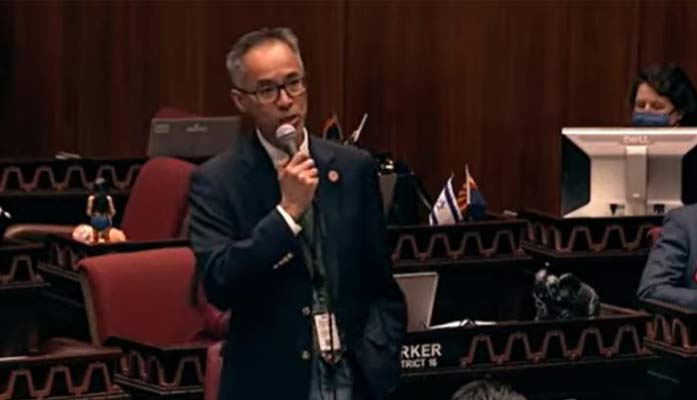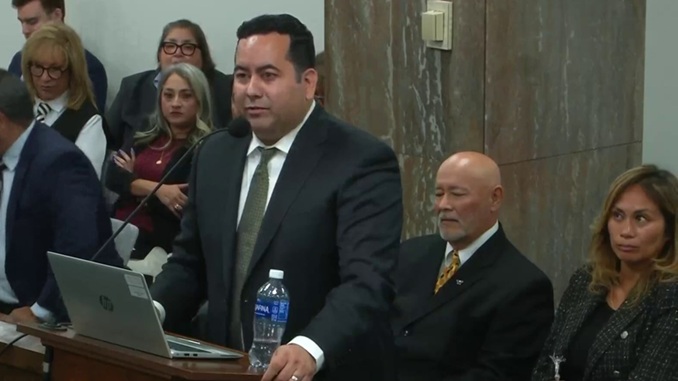
by Jonathan Eberle | Oct 4, 2025 | News
By Jonathan Eberle |
Arizona State Representative Quang Nguyen (R-LD1), Chairman of the House Judiciary Committee, was recognized as Legislator of the Year on Saturday at the 40th annual Gun Rights Policy Conference (GRPC) in Salt Lake City. The award highlights Nguyen’s role in advocating for Second Amendment protections at both the state and national levels. The GRPC, founded by Alan Gottlieb of the Second Amendment Foundation (SAF), brings together legal scholars, public officials, authors, and activists to address firearms policy and constitutional rights. Each year, SAF honors individuals who have made significant contributions to defending the right to keep and bear arms.
Gottlieb praised Nguyen during the ceremony, saying, “I have rarely encountered a public servant as principled and tireless as Representative Quang Nguyen of Arizona. Since his first day in office, Representative Nguyen has stood as a stalwart voice for your rights and mine, not just voting the right way, but leading from the front, shaping the debate, and holding the line against those who would erode our freedoms incrementally.”
Nguyen was joined at the conference by Arizona House Speaker Steve Montenegro and Representative Nick Kupper. Montenegro participated in a “Fireside Chat” moderated by Armed America Radio host Mark Walters, highlighting Arizona House Republicans’ record on gun rights.
In accepting the award, Nguyen emphasized his commitment to constitutional protections: “It is an incredible honor to be recognized by the Second Amendment Foundation as Legislator of the Year. I will always defend the Constitution as written and protect Arizonans’ right to self-defense. I am grateful to Speaker Montenegro and Representative Kupper for standing with me in defense of the Second Amendment. House Republicans will continue to lead Arizona in the fight to preserve our rights.”
The 2025 conference featured dozens of speakers addressing issues surrounding firearms law, policy, and the future of the Second Amendment.
Jonathan Eberle is a reporter for AZ Free News. You can send him news tips using this link.

by Jonathan Eberle | Oct 3, 2025 | Education, News
By Jonathan Eberle |
State Superintendent of Public Instruction Tom Horne is sounding the alarm over what he describes as “catastrophic” levels of chronic absenteeism among Arizona high school students, citing a new report from the Helios Foundation. The Helios report defines chronic absenteeism as missing nine days in a semester or 18 days in a school year. According to the findings, 28.1 percent of Arizona students in grades 1–8 are chronically absent. That number climbs to 37 percent among high school students.
“This is catastrophic. We cannot teach students who are not in school,” Horne said. “The high school student who misses more than one third of his classes is facing a bleak future.”
Horne highlighted the Dysart Unified School District in the Phoenix area as a standout example of combating the problem. Dysart has significantly lower absenteeism rates—9 percent in grades 1–8 and 8.69 percent in grades 9–12—compared to state averages.
According to Horne, Dysart enforces strict accountability measures: students in grades 1–8 who miss 18 days in a year must repeat the grade, while high school students who miss more than nine days in a semester cannot receive credit for their courses.
“They got there because they held students and parents accountable,” Horne said. “The Dysart method is successful and makes sense. It is what schools mostly did in the past before our culture got so much more permissive. Academic loss is the price we have paid for that permissiveness.”
Horne also pointed to the role of parents in ensuring daily attendance. He said the pandemic shifted some attitudes, with parents viewing absences as less serious than before. He argued that once parents understand the direct link between absenteeism and on-time graduation, they become more engaged.
“As a former member of a school board for 24 years, I can testify that it is very important to parents that their children graduate on time,” Horne said. “The data show the Dysart method is the most effective way to reduce chronic absenteeism.”
Jonathan Eberle is a reporter for AZ Free News. You can send him news tips using this link.

by Jonathan Eberle | Oct 2, 2025 | News
By Jonathan Eberle |
Two Arizona lawmakers are raising concerns over what they describe as a failure by the Governor’s Residential Utility Consumer Office (RUCO) to assist local families facing steep water and sewer rate hikes.
Representatives Teresa Martinez and Chris Lopez, both Republicans representing Legislative District 16, sent a letter to RUCO Director Cynthia Zwick questioning the agency’s handling of constituent requests tied to two pending Picacho Water & Sewer Company rate cases. The utility, which is foreign-owned, has sought increases that residents say are excessive and unfair.
According to the lawmakers, multiple constituents reached out to RUCO for support but received delayed responses—or, in some cases, no intervention at all.
“RUCO exists to stand up for utility consumers, not ignore them,” Rep. Martinez said. “Our constituents are understandably frustrated. They’re facing steep hikes from a foreign-owned utility, and when they turned to the Governor’s office for help, they got silence and a refusal. They deserve better.”
The letter from Martinez and Lopez asks RUCO to provide detailed information about how the office logs and tracks consumer complaints, its response timelines, and who within the agency handled calls regarding the Picacho cases. It specifically requests the dates those calls were received and when responses were issued
Rep. Lopez emphasized the need for accountability: “We’re pressing for answers because these families deserve accountability. Ratepayers shouldn’t be left in the dark when they turn to the very office meant to advocate for them.”
The lawmakers, joined by Senator T.J. Shope of the same district, also requested an in-person meeting with RUCO to review its consumer response practices.
The dispute centers on Docket Nos. W-03528A-25-0056 and SW-03709A-25-0057, in which Picacho Water & Sewer Company has asked regulators to approve rate increases. Residents have argued the proposals would impose unfair financial burdens, particularly given the utility’s ownership outside the United States.
Jonathan Eberle is a reporter for AZ Free News. You can send him news tips using this link.

by Jonathan Eberle | Oct 2, 2025 | Education, News
By Jonathan Eberle |
The Autism Academy for Education and Development (AAED), Arizona’s first fully accredited autism-only K-12+ private day school, has officially expanded its reach with the opening of a new campus in North Phoenix. The school marked the occasion with a ribbon-cutting ceremony attended by families, community leaders, and representatives from the Phoenix Mayor’s Office. Academy Founder and Director, Laura Newcomb, also recognized Arizona attorney and Attorney General candidate Rodney Glassman for his support and advocacy on behalf of families with children on the autism spectrum.
Founded in 2013, AAED now operates six in-person campuses across the Phoenix and Tucson areas, along with a virtual academy. The organization serves students across the autism spectrum through individualized education and therapy services designed to foster both academic and social growth.
The new North Phoenix campus has been purpose-built with features tailored to students’ needs. These include:
- Multi-sensory classrooms
- Small group instruction and low student-to-teacher ratios
- Individualized education plans (IEPs)
- Integrated speech and occupational therapy with oversight from Board-Certified Behavior Analysts
Beyond academics, the facility also offers sensory rooms, outdoor learning areas, and collaborative spaces designed to help students develop life skills such as communication, independence, and decision-making.
“Bringing our proven, individualized approach to autism education to North Phoenix allows us to reach more families and students who deserve access to specialized services close to home,” Newcomb said. “We designed this campus to foster independence, social growth, and academic achievement in every student.”
Jonathan Eberle is a reporter for AZ Free News. You can send him news tips using this link.

by Jonathan Eberle | Oct 1, 2025 | Education, News
By Jonathan Eberle |
A dispute over public records has emerged between state lawmakers and the Tolleson Union High School District, after the district declined to provide financial transaction records requested by the Legislature.
The conflict began after a July 21 Joint Legislative Audit Committee (JLAC) hearing on school district finances. Committee Co-Chairman Rep. Matt Gress (R–LD4) followed up with a formal request on August 26 seeking two years of financial records, including purchase orders, contracts, and payments to vendors.
Instead of complying, the district responded by refusing to release electronic records and imposing more than $26,000 in fees for hard copies—charges Gress argues are intended to deter requests. State law allows agencies to charge for the actual cost of copying or mailing records, but not for producing electronic files.
In a September 17 letter, Gress accused the district of setting “a dangerous and unacceptable precedent” by blocking access to basic financial information. He described the district’s stance as unprecedented, saying that other Arizona school districts have provided similar data without incident.
“Exporting purchase orders from financial software is simple, and other districts have complied quickly,” Gress said. “This refusal denies lawmakers the basic financial information needed to evaluate reforms and ensure tax dollars are spent responsibly.”
The lawmaker also raised concerns about the district’s reported consultation with the Arizona Attorney General’s Office. Gress noted that Attorney General Kris Mayes has previously provided records to the Legislature when her own office was under review. “It would be deeply troubling,” he said, if the Attorney General advised a district to withhold documents from legislative oversight.
In correspondence with the district, Gress emphasized that Arizona law (A.R.S. § 39-121 et seq.) grants the public the right to inspect government records and restricts fees to copying or mailing costs. He criticized the district’s explanation that the charges were meant to compensate staff time and discourage what it called “unreasonable” requests.
Jonathan Eberle is a reporter for AZ Free News. You can send him news tips using this link.





